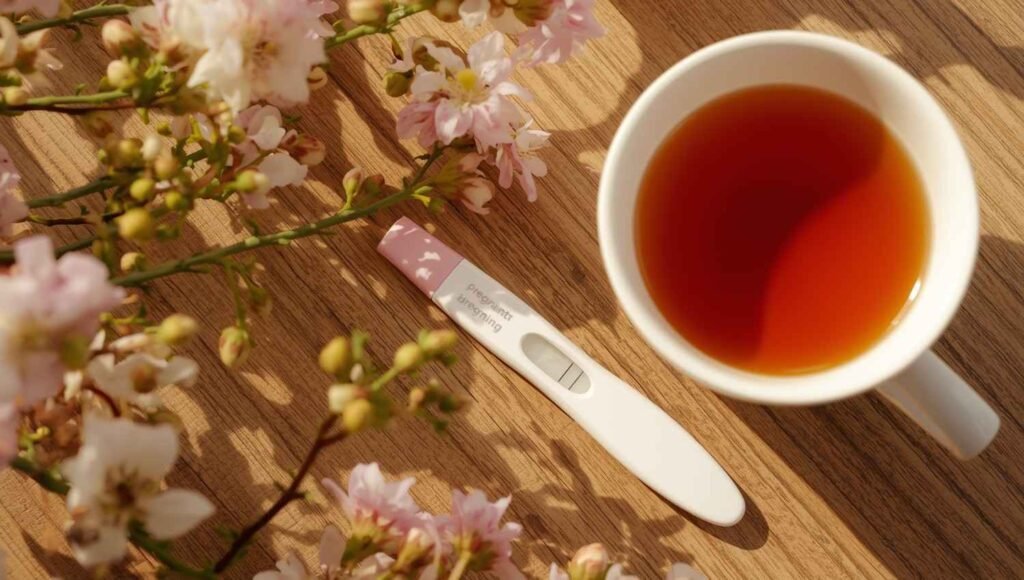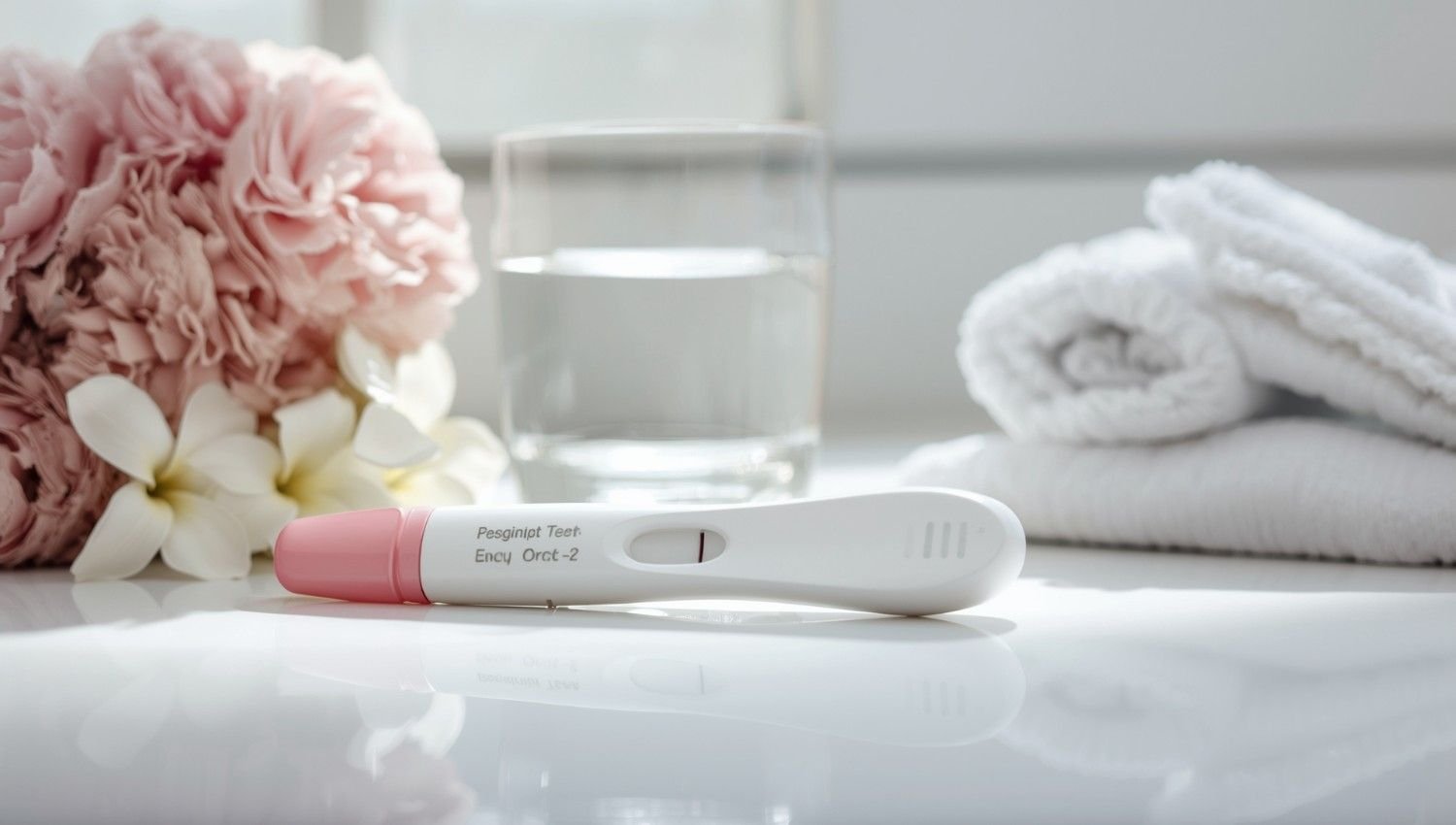Introduction
From my experience working with new mothers, one of the first things they ask about are pregnancy tests and how these at-home pregnancy tests actually work. These home pregnancy tests are the most common type because they are simple to use and highly trusted. They look for a special hormone called human chorionic gonadotropin (HCG) that develops in a woman’s body only during pregnancy. You can take these tests using pee or even blood, depending on the method you choose.
How Do Pregnancy Tests Work?
Most people rely on home kits because when used correctly, they can be 99% accurate, which is why I also recommend them to first-time users. These tests look for rising levels of HCG, and since that hormone only develops after implantation, the timing matters. Whether you prefer at-home pregnancy tests or clinical ones, both are designed to detect the same special hormone, making them safe, easy, and reliable when used correctly.
Pregnancy Tests
Overview — 5 Signs You May Need to Take a Pregnancy Test and When to Take It
If you miss a period, especially after you forgot your pill or are hoping to conceive, it’s a good idea to take a pregnancy test. Many women I’ve guided over the years notice subtle signs before the first day of a missed period, and while some tests can detect pregnancy even before your period is due, waiting gives a more reliable result. This is because your body needs time to increase its levels of the hormones these tests measure.
From experience, testing before your expected date often leads to a false negative result, not because you’re not pregnant, but because pregnancy tests work by detecting HCG, and it may not be high enough yet. So, if you’re wondering how soon to test, the safest point is from the first day of a missed period, especially when you think you may be pregnant.
What Is a Pregnancy Test?
A pregnancy test is used to determine if you’re pregnant by detecting human chorionic gonadotropin (HCG) — a hormone your body makes from the very beginning of pregnancy. As your body starts to go through changes to support the cells that develop into your baby, the production of HCG begins to rise. These HCG levels start to build up once a fertilized egg implants in the uterus, usually around six to 10 days after conception.
There are two main types of pregnancy tests — urine tests and blood tests. A urine test at home, also called a home pregnancy test, is easily available over the counter without a prescription, while blood tests to check for pregnancy are done by your healthcare provider by giving a sample of your blood. In some cases, your provider may confirm a pregnancy using an ultrasound. You might take a test when trying to get pregnant, after a positive result, if you experienced an issue with your birth control, before a medical procedure, or when planning to start a new medication that could be complicated by pregnancy. If you have any questions about your test results, the best thing to do is to reach out to your healthcare provider.

How Soon Can You Take a Pregnancy Test?
Modern tests are very sensitive and can show if you are pregnant even before your period is due, but for the best and most accurate result, it’s ideal to wait until the first day of a missed period — or even a week after your missed period. Although traces of HCG may appear as early as 6 days after ovulation, it usually takes 7–10 days after ovulation for the body to build up enough HCG to show up on a test. If you have an irregular cycle and don’t know when your period is due, it’s safer to take the test at least 21 days after having sex, especially if it was without birth control or you’re concerned your birth control may not have worked. Testing too early increases the chance of an inaccurate result.
How Pregnancy Tests Work?
Whether you’re trying to conceive or concerned that your birth control went wrong, a pregnancy test can help confirm your status — but taking it too soon may lead to a false result. Pregnancy tests work by measuring levels of chorionic gonadotropin (HCG) — a hormone only present if you’re pregnant. The body only releases HCG after a fertilized egg attaches to the uterus, a process called implantation, which usually happens around 10 days after conception when the sperm fertilizes the egg. OTC pregnancy tests simply test your urine for the HCG hormone, and how you test your urine will depend on the kit you choose.
How to Perform the Test?
Most home pregnancy tests are almost 99% effective when used correctly, and you can collect your urine in a cup, then dip a testing stick into the liquid, or collect your urine in a cup and use an eyedropper to move a small amount of fluid into a special container. Another way is to place the testing stick directly into the area of your expected urine stream so it catches your urine midstream, as recommended by the Office on Women’s Health.
Steps
Collect your urine in a cup and dip a testing stick into the liquid. Collect your urine in a cup and use an eyedropper to move a small amount of fluid into a special container. Place the testing stick into the area of your expected urine stream so that it will catch your urine midstream
How to Read the Results?
You can test in the privacy of your own home. Simply open the test, follow the instructions, and wait for the recommended time to view the results. Once the recommended waiting time has passed, the tests will display your results through a change in color, a line, a symbol such as plus or minus, or the words “pregnant” or “not pregnant,” usually with a result within a few minutes.
What Hormone Levels Are Checked for a Pregnancy Test?
A pregnancy test checks for an elevated amount of HCG, and levels of HCG rise quickly, often doubling every few days during the first weeks of pregnancy. The placenta produces HCG, and only pregnant women have a placenta, which develops shortly after a fertilized egg attaches to your uterine wall.
When Should I Take a Pregnancy Test?
If you think you could be pregnant, it’s a good idea to take a test, but home pregnancy tests differ in how early they’ll detect a pregnancy. While you may get a positive result as early as 10 days after conception, a more accurate result comes when you wait until after you’ve missed your period. If you test too soon, it could be negative even if you’re pregnant, so if you get a negative test and then miss your period, you should take another test.
What Time Should I Take a Pregnancy Test?
The best time to test is with your first morning pee, as the HCG concentration is highest then. However, pregnancy tests are sensitive enough to detect HCG no matter what time of day. If testing later, wait until it’s been three hours since your last pee before you take the test. You could also take two pregnancy tests to confirm you get the same result.
How Do Pregnancy Tests Work?
Pregnancy tests work by looking for the amount of human chorionic gonadotropin (HCG) — a hormone found as HCG in your body, specifically in your urine or blood. Since HCG needs time to build up in early pregnancy, the body will create more HCG, increasing more and more HCG in your body, which is why a test too soon will come back negative. Pregnancy tests react to the amount of HCG, where reactive paper detects the HCG and displays a plus sign, double vertical lines, or the word “pregnant”. Different tests show a positive result differently, so always read the directions. The control window shows up first, and a symbol in this window tells that the test is working. Different brands take different times to show a result. In a blood test, a sample is sent to a lab, where the lab determines the amount of HCG in your blood, and your provider contacts you with the results.

Five Signs You May Be Pregnant
Signs you should take a pregnancy test
You’ve Missed Your Period
missed period, first and most reliable signs of pregnancy, don’t track your cycle closely, hard to determine whether or not you’re late, 28-day menstrual cycle, cycles can vary from 24–38 days, taking a test more than a month since last period, factors delay a period, stress, medications, medical conditions, changes in birth control, light bleeding or spotting, early weeks of pregnancy, egg buries deeper into uterine lining, implantation, resemble a light period, does not follow usual pattern or timing, difference in color, texture, amount of blood, seek medical advice, bleeding and a positive pregnancy test, reasons your period might be late.
You Have Cramps
Implantation produces feelings similar to menstrual cramps, early pregnancy discomfort, think your period is around the corner but never comes, consider taking a test, and causes abdominal cramps.
Your Breasts Hurt
As pregnancy progresses, the body produces more estrogen and progesterone, hormones that make changes to support the baby’s growth, increase blood flow, cause breasts to feel tender, appear bigger, nipples might hurt, and veins look darker under the skin. Symptoms common before a period don’t necessarily mean pregnant; reasons you may have breast pain.
You’re Feeling Different
cramps, sore breasts, early pregnancy causes nausea, food aversions, exhaustion, frequent urination, symptoms get stronger before HCG levels even out, weeks go on, first trimester, pay attention to your body, unusual changes prompt pregnancy test.
Your Birth Control Method Failed
birth control pills, condoms, other methods not 100% protection, slight chance of pregnancy, careful use, birth control pills over 99% effective with perfect use, realistically around 91% effective, condoms break and tear, male condoms 98% effective perfect use, 82% effective typical use, long-term methods like intrauterine device (IUD), more reliable, reversible, using birth control, worth having pregnancy test, other signs indicate pregnancy.

What Are the Different Types of Pregnancy Tests?
The two main types of pregnancy tests: urine tests, blood tests. Urine tests done at home, urine test at a healthcare provider’s office, where the provider can perform a blood test.
At-Home Pregnancy Test
An at-home test uses your pee to look for HCG. Special strips detect HCG, about 99% effective when used correctly, same accuracy rate as a provider’s office, available in drug or grocery stores. easy to use, inexpensive, read the instructions before taking, three ways to take an at-home pregnancy test
pee in a clean cup, place drops on the chemical strip, place the pregnancy test strip in your urine stream, pee in a clean cup, and dip the test strip in the pee
HCG is detected in urine about 10 days after conception. Taking after you miss your period reduces false-negative results; a missed period happens around 14 days after conception
Use first morning pee, the most concentrated HCG levels, pee in the bladder at least three hours, don’t drink excessive fluids, dilute HCG levels, check the expiration date, read directions thoroughly, and follow every step exactly.
Blood Test
blood test rarely done, expensive, same result as urine test, small sample of blood from a vein, detects pregnancy hormone, determines how much hormone is present, know exact amount of HCG, women having fertility treatments, provider thinks there might be a problem, slightly more sensitive than urine tests, detect very small levels of HCG, accurate answer early in pregnancy, seven to 10 days after conception, blood sample taken at provider’s office or hospital, sent to lab for analysis, results take few hours to two days, compare HCG levels during pregnancy, HCG levels double every two days, levels don’t rise suggest a problem, extremely high HCG levels mean carrying twins or issue with pregnancy.
Are All Home Pregnancy Testing Methods the Same?
Most brands of at-home pregnancy tests are reliable; the exact testing method can differ, but all look for HCG in your body. At-home test gives the same result; the sensitivity of the test differs; more sensitive tests detect HCG sooner. The most accurate reading is when waiting until the missed period. All tests are accurate at that point.
What Are the Advantages of Using a Home Pregnancy Test?
Pregnancy tests are inexpensive, easy to use, home tests provide results quickly, at-home pregnancy tests 98% to 99% accurate, positive results are trusted, false negative results if taken too soon, blood tests are more expensive, inconvenient, and detect pregnancy sooner, and only tests show specific amounts of HCG in your body.
Is There Anything You Shouldn’t Do Before a Pregnancy Test?
Most pregnancy tests don’t ask to avoid activities, don’t change lifestyle, only medication interfering with fertility medication containing HCG, helpful tips, read instructions carefully, wait until you miss your period, use your first pee or a full bladder, chugging water before the test affects results.
Results and Follow-Up — How Long Does It Take to Get Results of a Pregnancy Test?
each home pregnancy test different, read instruction manual, tells how many minutes to wait, in most cases wait three minutes, waiting too long may be inaccurate, faint line could mean pregnant, control window indicates test taken correctly, instructions outline everything, unsure of result contact healthcare provider, faint line different than evaporation line, evaporation line appears if wait too long, pee is dry, read result before 10 minutes, ensures pee doesn’t dry up, avoid evaporation line.

How Soon Will a Pregnancy Test Be Positive?
depends on the type of test you use; some at-home pregnancy tests detect pregnancy before a missed period. The most accurate results are obtained by waiting until a missed period.
How Accurate Are Pregnancy Tests?
Pregnancy tests are about 99% accurate when used correctly.
How Common Are False Results on Pregnancy Tests?
false results, false negative, false positive, happen due to using the test incorrectly, the main reason for false-negative testing too early, false-negative results from using too much or too little pee, follow the directions on the test kit, get an accurate result.
Can a Positive Test Be Wrong?
false positive rare, happens in a chemical pregnancy, loss of pregnancy shortly after the fertilized egg attaches to the uterine wall.
What Type of Pregnancy Test Confirms Pregnancy First?
A blood test confirms pregnancy first, and detects a smaller amount of HCG compared to a urine test.
Are There Any Medications That Can Change the Result of My Pregnancy Test?
Medications don’t change pregnancy test results; antibiotics, pain relievers, and alcohol don’t impact results; fertility drugs exception, and fertility medications cause false positives. Reach out to a healthcare provider.
What Should I Do After Getting a Positive Pregnancy Test?
Take prenatal vitamins, vitamins with folic acid, prevent complications during fetal development, call a healthcare provider for an appointment, pursue healthy habits, do not drink alcohol or smoke during pregnancy, and limit caffeine during pregnancy.
Additional Details — Will an Ectopic Pregnancy Show Up on a Pregnancy Test?
Positive result on pregnancy test, even with an ectopic pregnancy.
Conclusion
Understanding when and how to take a pregnancy test can make a significant difference in getting accurate results and timely care. Suppose you experience signs like a missed period, breast tenderness, or have had unprotected sex. In that case, it’s wise to test — ideally after your expected period or with your first morning urine for better HCG detection. Taking the test at the right time ensures you receive the proper guidance and prenatal care early on if you are pregnant. In case of a positive result, promptly connecting with your doctor will help you make informed decisions and move forward with confidence.
Frequently Asked Questions
How accurate are at-home pregnancy tests?
At-home pregnancy tests are typically up to 99% accurate — but only when used correctly and not taken too early.
How soon can a pregnancy test show a positive result?
Some brands claim to detect pregnancy as early as 6 days before your expected period, but results at that stage are more likely to be incorrect due to low HCG levels.
Can pregnancy be detected just 5 days or 2 weeks after sex?
Testing 5 days after sex is usually too early and may give an inaccurate result. Even at 2 weeks, accuracy depends on your cycle and ovulation timing.
What are the earliest signs of pregnancy?
Early signs may include a missed period, light spotting that doesn’t resemble your usual menstruation, sore or sensitive breasts, mild cramps, or simply feeling unusually different.

